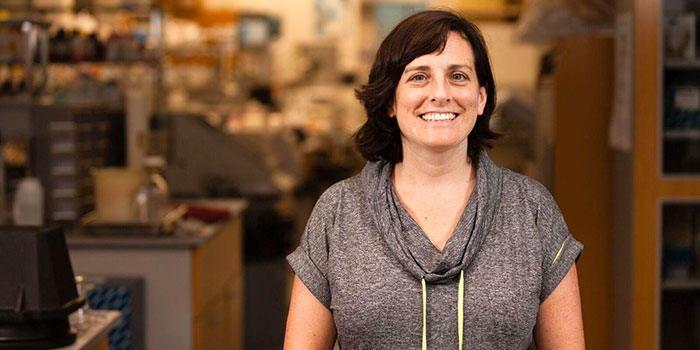
The Pew Charitable Trust named Dr. Wendy Gordon a 2016 Pew Scholar in the Biomedical Sciences. Gordon is an assistant professor in the Department of Biochemistry, Molecular Biology, and Biophysics. Pew recognized 22 exceptional scientists from institutions across the country. The Pew Scholars Program in the Biomedical Sciences supports a highly select group of promising early-career investigators with four years of flexible funding to pursue foundational, innovative research.
Gordon studies how cells sense and respond to mechanical forces in their environment at a molecular level. Changes in cell or tissue stiffness are a hallmark of diseases such as atherosclerosis and cancer, reflecting drastic alterations in a cell’s tensional homeostasis. Gordon’s lab aims to understand how specific proteins on the surface of cells sense and respond to cellular forces.
“It’s pretty intuitive that mechanical factors are altered in disease. For example, tumors are often diagnosed because you feel a lump that is stiffer than the surrounding tissue,“ says Gordon. “But, not much is known about the proteins that are sensing and responding to force. My lab aims to zoom in to the surface of the cell and figure out the mechanisms that proteins are using to communicate mechanical stimuli to the inside of the cell, and how these mechanisms go awry during disease pathogenesis.”
Gordon and her team use custom tension sensors to measure the molecular forces experienced by individual proteins in the membranes of cells, allowing them to identify the proteins that act as force sensors and assess how these proteins and their responses are altered by disease. They also apply tiny forces to individual proteins by attaching magnetic beads to them to measure responses inside the cell. Her findings could lead to novel diagnostics and therapeutics for disorders, such as cancer, that perturb the “mechano-some”—all the mechanical factors in cells that contribute to cellular development and dynamics.
Gordon received her doctorate in physical chemistry from the University of Chicago and then performed post-doctoral studies at the University of Chicago and Harvard Medical School. She joined the faculty at the University of Minnesota, in the Medical School and the College of Biological Sciences, in 2014.
The last University of Minnesota faculty member to receive the distinction was Melissa Gardner, an associate professor in the Department of Genetics, Cell Biology and Development, in 2011.